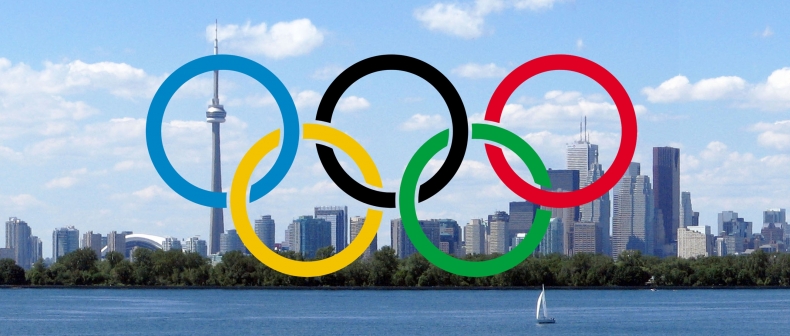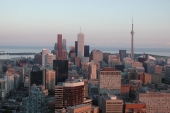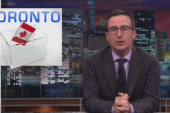
The September 7th selection of Tokyo as the host city for the 2020 Olympic Games may, in retrospect, have been a subtly important moment for the City of Toronto.
As the 2016 Olympics are scheduled for Rio, and the 2012 Olympics were hosted by London England, the unwritten rules of the IOC would imply that the 2024 Games will almost certainly take place in North America, which by then won’t have hosted a Summer Games since the ill-fated 1996 Atlanta Games. In fact by 2024, with the exception of North America (and Africa), every populated continent will have hosted a twenty first century Summer Games; problematic considering the associated North American television revenues that support the IOC in the lifestyle to which it has become accustomed to.
2024 would also mark 48 years since the last Canadian Summer Olympics, Montreal’s 1976 heures de gloire. This multi-decade gap is similar to the 44 years that passed between Australia’s two summer games: Melbourne in 1956 and Sydney in 2000. Buttressing this all-important numerology, it was also 12 years between Montreal and the 1988 Calgary Games. Should Toronto host the 2024 games, 14 years would have passed between Toronto and Vancouver 2010.
For the world’s greatest urban popularity contest, which is really all about timing (with a dash of international bribery, say what?), the salivating possibility of a Toronto Olympics suddenly seems attainable if the people and our various levels of government actually want it.
Toronto is no stranger to the merry go-round that is the Olympic Bid process. Having lost the 1996 Olympiad to Atlanta and the 2008 Games, Toronto is kind of like the Katharine Heigl of the Olympic world. Trust-worthy to show up, play nice and look good as a bridesmaid, Toronto, in the eyes of the IOC, has never walked down the aisle first.
Toronto’s best chance at hosting the Olympic Games was in 1996. Though an early favourite, Toronto’s bid would be felled by centennial sentiment towards Athens, as well as the all mighty American corporate dollar (both above the table and below) which eventually tipped Atlanta over the top. Toronto’s technically proficient bid for 1996 was further damaged by local activist group: Breads Not Circuses, which argued that Toronto would be better off spending money in support of its homeless population instead of building temporary homes for international athletes.
Torontonians may wax poetic about our 2008 bid, blaming our then colourful mayor (plus ça change…) for his comments on Africa as impediments to our success (“What the hell would I want to go to a place like Mombasa for? … I just see myself in a pot of boiling water with all these natives dancing around me.”) any city bidding for the 2008 Olympiad whose name didn’t start with Bei and end with Jing was a kamikaze mission.
The 2024 Summer Games are to be awarded in 2017, with formal bidding to begin in 2015. With the selection of Tokyo and the IOC’s continued reluctance at awarding the United States another Olympics, Toronto is perfectly situated to benefit from the heavily populated Eastern Time Zone without actually being in America. With Toronto’s chances of winning a 2024 bid increasingly plausible, the question for those players who have the power to make these things happen is whether Toronto even wants the Olympics, and, more likely, whether we can handle it.
Toronto is currently preparing to host the 2015 PanAm Games, a considerably smaller endeavour then the Olympics: our PanAm Games are expected to host 7,500 athletes from 42 countries, comparatively the London Olympics hosted over 10,000 athletes from over 200 countries. While our PanAm budget is 1/10 of London’s $15B Olympic Budget, that money sure could buy a few more stops on our mythical Scarborough Subway.
And even on its relatively small scale the PanAm games have not been without controversy: Premier Kathleen Wynne has lashed out at PanAm organizers for expensing things like tea from Starbucks while Sport Minister Michael Chan has admitted that the PanAm budget doesn’t include the $700M being spent on its Athlete village, arguing that because the Village will be used for affordable housing afterwards, it shouldn’t be counted as part of the PanAm infrastructure needs. Most recently a $7 million bonus plan was revealed for senior PanAm employees much to the consternation of opposition politicians at Queen’sPark.
Bribery and bombings aside the Olympics, the ne plus ultra of world events, are no stranger to funding controversies either. The Montreal Olympics are probably the most well known for being a financial basket case. Though Montreal Mayor Jean Drapeau may have said that, “The Olympics can no more lose money than a man can have a baby,” it took Montreal until 2006 to pay off the billion dollar debt associated with its rather useless Olympic Stadium nicknamed the Big Owe. Even in Vancouver, which ran a games as proficient as probably possible, had problems paying for and reusing parts of its Olympic Village.
For all cities that host large-scale international events the question of economic justification is not without merit. Economists at CIBC World Markets have somehow hypothesized that the PanAm games will generate over 26,000 jobs for Toronto. In Vancouver, Price Waterhouse Cooper’s audit estimated that the games contributed $2.5 billion to Vancouver’s economy employing 45,000 people. However, any real estimation of economic ROI for any large-scale endeavour is nothing more then voodoo mathematics. First of all official Olympic Budgets (if there is such a thing) don’t really paint a complete picture of total costs. For example, the Vancouver Olympic Budget, pegged at $1.7 billion (including $800 million spent on infrastructure), didn’t include the costs of associated infrastructure projects, such as the Canada Line SkyTrain ($2 billion) or the necessary upgrade to the Sea-to-Sky Highway ($1 billion). Considered legacy projects these types of costs are often left out of “bid-book” expenses. Legacy infrastructure is the same argument that Michael Chan used to explain why Toronto’s PanAm village was excluded from the Games’ budget.
Controversies aside, Toronto continues to have a bit of a boner for anything international in scope. Beyond the PanAm Games, city leaders are focusing efforts rather obsessively on other pageants, making strange bedfellows of Rob Ford and Kristyn Wong-Tam who both headed to Ottawa hat in hand demanding federal support for Toronto’s 2025 World Expo Bed (yes, World Expos still happen).
There is something unquantifiable about our innate need to host the Olympics. For a city of like Toronto, which desperately wants to be invited to sit at the cool kids table (on Wednesdays, London, Paris and Hong Kong wear pink), the Olympics are a meaningful peg on our slow march towards alpha status. Vancouver also proved that there’s also something tangibly sentimental about the Olympic movement, especially in an era when we’re all pegged to our keyboards tweeting away our future.
That being said, however, as Bread Not Circuses noted so many years ago, the Olympics are not all Wayne Gretzky torch carrying and HBC red mittens. The problem with the simplistic attitude of Bread and Not Circuses that is evident for anyone who has worked at any level of government is that wherein one pool of money exists, another pool of money can be taken away. Governments don’t work rationally like you or I do to manage our chequebook (a shocker I know).
It would be naïve to think that hosting an Olympics will bring untold riches to Toronto or without spending money on the Olympics we could solve the cluster-F that is Toronto Community Housing for example. The reality is that the Olympics have proven as a catalyst for mega-projects, as well as an excuse to invest in necessary infrastructure. Legacy investments in London transportation amounted to over $10B. As a result, subway trains in London’s 150 year Jubilee line were able to run twice as frequently, while an entirely new Overland line was culled together linking most of the London’s north shore with disparate lines in the East End. In Vancouver, the Olympics proved to be a catalyst to construct an underground LRT line to airport; in comparison Gregor Robertson is still clamouring on deaf ears for a Broadway subway. Even locally, the Union Pearson Air Rail Link, one the shocking reminders of Toronto’s sub-par transit infrastructure, is finally being built (at a cost of $456M) so that we don’t embarrass ourselves when the Games come to town.
Toronto, as is probably painfully obvious, is a city that is sadly a few mega-projects short of a full stack. And while the Olympics are certainly no panacea for what ails in its entirety, if it takes the Olympics to move the needle on important projects like the revitalization of the Portlands or the Downtown Relief Line then Toronto would be stupid to kick a potential gift horse in the mouth. There are few opportunities to hit a single switch resulting in billions of dollars poured into infrastructure. If the timing is right for Toronto in 2024 — we’d be remiss not to seize the day.
Besides — who doesn’t want to wear pink on Wednesday? The Olympics are really so fetch.
Correction: This article previously stated that Perth hosted the Olympics in 1960 and Sydney hosted in 2008. In fact, Melbourne hosted the Olympics in 1956 and Sydney hosted in 2000. We regret the error.
____
Jonathan Naymark is a Toronto-based writer. Follow him on Twitter @naymark.
For more, follow us on Twitter @TorontoStandard and subscribe to our newsletter.














